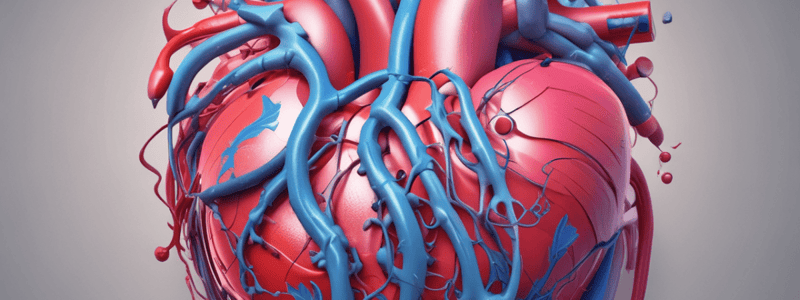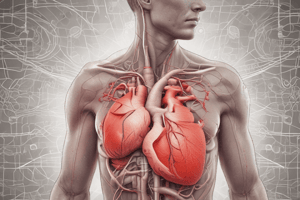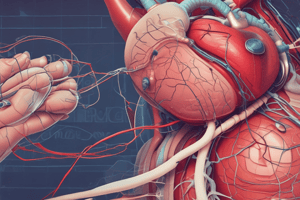Podcast
Questions and Answers
What is responsible for the production of heart sounds?
What is responsible for the production of heart sounds?
- Vibrations caused by the sudden opening of valves
- Vibrations caused by the sudden closure of valves (correct)
- Myocardial relaxation
- Vibrations caused by the rushing of blood out of the heart chambers
Which phase of the cardiac cycle does the first heart sound occur in?
Which phase of the cardiac cycle does the first heart sound occur in?
- Isometric relaxation phase
- Filling phase
- Isovolumetric contraction phase (correct)
- Ejection phase
Which heart valves are responsible for the first heart sound?
Which heart valves are responsible for the first heart sound?
- Mitral and tricuspid valves (correct)
- Aortic and pulmonary valves
- Tricuspid and pulmonary valves
- Mitral and aortic valves
What are the two heart sounds typically audible through a stethoscope?
What are the two heart sounds typically audible through a stethoscope?
During which phase of the cardiac cycle does the second heart sound occur?
During which phase of the cardiac cycle does the second heart sound occur?
What is the cause of the second heart sound?
What is the cause of the second heart sound?
Which phase of ventricular activity is associated with isometric contraction?
Which phase of ventricular activity is associated with isometric contraction?
Which heart sound occurs at the end of ventricular diastole during atrial systole?
Which heart sound occurs at the end of ventricular diastole during atrial systole?
Which heart sound is normally inaudible?
Which heart sound is normally inaudible?
Which heart sound is associated with concentric ventricular hypertrophy?
Which heart sound is associated with concentric ventricular hypertrophy?
Which heart sound is produced by the closure of the AV valves?
Which heart sound is produced by the closure of the AV valves?
Which phase of the cardiac cycle is the S2 heart sound associated with?
Which phase of the cardiac cycle is the S2 heart sound associated with?
Which phase of the cardiac cycle is the S3 heart sound associated with?
Which phase of the cardiac cycle is the S3 heart sound associated with?
Which phase of the cardiac cycle is the S4 heart sound associated with?
Which phase of the cardiac cycle is the S4 heart sound associated with?
What is the main cause of the first heart sound (S1)?
What is the main cause of the first heart sound (S1)?
Which heart sound is described as low-pitched with a longer duration?
Which heart sound is described as low-pitched with a longer duration?
Where is the first heart sound (S1) best auscultated?
Where is the first heart sound (S1) best auscultated?
What is the cause of the second heart sound (S2)?
What is the cause of the second heart sound (S2)?
Which heart sound is also known as the 'gallop' sound?
Which heart sound is also known as the 'gallop' sound?
In which conditions is the third heart sound (S3) considered pathological?
In which conditions is the third heart sound (S3) considered pathological?
What is the cause of the fourth heart sound (S4)?
What is the cause of the fourth heart sound (S4)?
Which statement is true about the second heart sound (S2)?
Which statement is true about the second heart sound (S2)?
Flashcards are hidden until you start studying
Study Notes
Heart Sounds
- Four heart sounds can be recorded via phonocardiography, but normally only two, the first and the second heart sounds, are audible through a stethoscope.
- Heart sounds are produced by:
- Vibrations caused by the sudden closure of valves
- Myocardial contraction
- Vibration caused by rushing of blood into the chambers of the heart
Volume Pressure Loop
- Definition: Relation between left ventricular volume and left ventricular pressure
- Phases:
- Isometric contraction phase
- Ejection phase
- Isometric relaxation phase
- Filling phase
First Heart Sound (S1)
- Cause: Sudden closure of AV valves (Mitral and tricuspid valve)
- Occurs: At the beginning of ventricular systole (Isovolumetric contraction phase)
- Characters:
- Low pitched (25 – 45 Hz)
- Longer duration (0.14 Sec)
- Gives the sound of "Lub"
- Site: Auscultated in:
- Mitral area: Apex of heart (5th intercostal space mid clavicular line)
- Tricuspid area: Between 4th and 5th space close to lower left quadrant of sternum
Second Heart Sound (S2)
- Cause: Closure of Semilunar valves (Aortic and pulmonary valves)
- Occurs: At the end of ventricular systole (Isovolumetric relaxation phase)
- Characters:
- High pitched (50 Hz)
- Shorter duration (0.11 sec)
- Gives the sound of "Dub"
- Site: Auscultated in:
- Aortic area: Rt 2nd intercostal space
- Pulmonary area: Lt 2nd intercostal space
Third Heart Sound (S3)
- Causes: Rushing of blood from atria into ventricle during rapid filling phase
- Also known as: Gallop
- Physiological causes:
- Normally heard in most children
- Athletes
- Pregnant female
- Pathological causes:
- Congestive heart failure
- Aortic regurge
- Dilated cardiomyopathy
Fourth Heart Sound (S4)
- Cause: Atrial contraction (atrial systole) → vibration of ventricular wall
- Occurs: During atrial systole
- Timing: Before S1
Studying That Suits You
Use AI to generate personalized quizzes and flashcards to suit your learning preferences.




